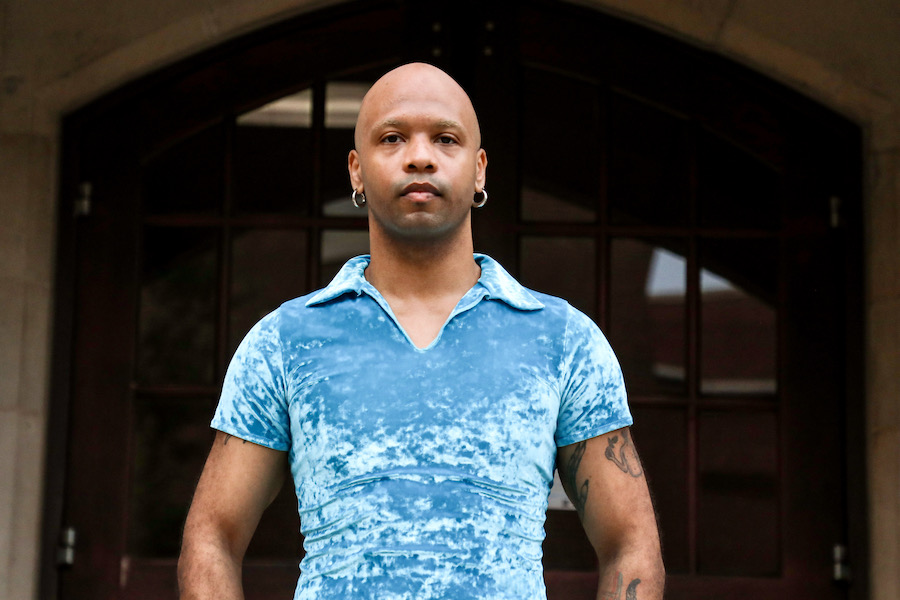Student Spotlight: Nicholas Goodly

Nicholas Goodly is a doctoral student pursuing a degree in creative writing through Florida State University's Department of English, part of the College of Arts and Sciences. They recently published their first collection of poetry entitled BLACK SWIM through Copper Canyon Press. Goodly is also a team member of the performing arts platform Fly on a Wall and an assistant poetry editor for the Southeast Review. Additionally, they were a finalist for the 2020 Jake Adam York Prize, runner-up for the 2019 Cave Canem Poetry Prize and a recipient of the 2017 Poetry Society of America Chapbook Fellowship. Goodly’s work has appeared in The New Yorker, Boston Review, BOMB, the Poetry Project, Lambda Literary and Narrative Magazine.
What year are you in school, and when do you expect to graduate?
I am a first-year doctoral student, and I expect to graduate in Spring 2027.
Tell us a little about your background, where you’re from and what brought you to FSU.
I was born and raised in Atlanta, Georgia. I earned my undergraduate degree from Georgia State University and my master’s degree from Columbia University in New York City. For the past five years, I have worked at public libraries in downtown Atlanta and spent most of my time reading and creating public programming for poetry and creative writing.
I came to FSU because it was time to explore my potential as a teacher and writer. I wanted to immerse myself in a community of people working with literature every day and challenge myself to engage on a more rigorous, critical level with new books and art that I couldn’t have found on my own.
What inspired you to pursue a degree in creative writing?
The biggest value of a creative writing degree is time. There are few opportunities in life where your priority can be your creative work. As a creative writing student, your time is expected to be used reading and writing, and you are free to get weird, play with language and forms, do a deep dive on artists that interest you, and lock yourself in your room and come out with pages of material. This behavior is encouraged! Not many situations in life offer that freedom.
What do you want the public to know about your studies? Why are your topics important?
Poetry is important because it offers a path to greater empathy. One of my pursuits as a writer is using poetry to better understand emotions through sensation and tactile response. I want to investigate new ways of feeling, ways built on intuition and guttural response, outside of intellectual understanding. That’s the sweet spot, where it’s most exciting to be human.
Tell me about your recently published collection of poetry “BLACK SWIM.”
“BLACK SWIM” is my debut collection published by Copper Canyon Press. The poems are layers of a multitude of voices — Black, queer, human, spirit. Through this lyric bombardment of the senses, the poems offer an immersive experience, a way to allow yourself access to new emotional landscapes. It asks what it means to know each other and challenges us to all become a little bit closer to one another.
What aspect of your areas of study do you find most rewarding?
With art, no experience is better than to see the work that you’ve done touch somebody else. Making that human connection through language, reaching someone in a meaningful way through your arrangement of words, that’s magic.
What are some current goals or projects that you’re working on?
Right now, I’m just playing around with more language, trying new experiments, reading new writers, etc. I am interested in writing a poetry book more connected to visual art with this next collection, but I don’t know exactly what that looks like yet.
Tell us about earning the Poetry Society of America Chapbook Fellowship.
My first major award was the 2017 Poetry Society of America Chapbook Fellowship. It was a great affirmation that my poems were touching people and that my path was taking me somewhere. It was also rewarding to have a platform where I could share my work and make further relationships through my art.
What on-campus resources have helped you achieve success?
I like attending the Jerome Stern Reading Series every Tuesday evening at The Bark here in Tallahassee. Community is huge to me, but poetry is such a solitary craft. So, being among other poetry lovers once a week is a necessary grounding experience. I also got to read-in the series myself, and it feels good to let people get to know me through my work.
Are there any faculty or staff who have helped or inspired you? Why/ how so?
The FSU poetry program folks have been incredibly welcoming. In particular, assistant professor of English L. Lamar Wilson has been a rock for me. Each of the English department’s faculty has so much to offer, and they are all so stylistically different from one another. I can’t wait to take classes from every one of them.
Following your graduation, what are your plans? Even though you might miss FSU, what are you looking forward to once you graduate?
I want to teach more creative writing in the future. I look forward to more opportunities and space for myself to be an artist and to create work.
